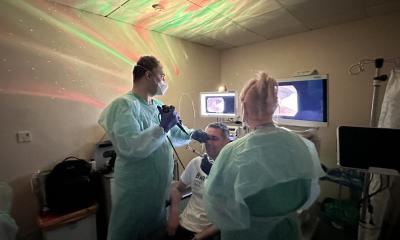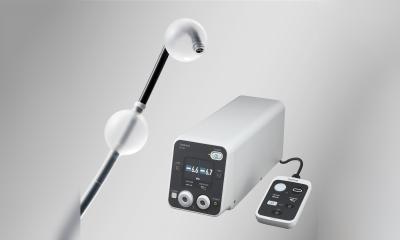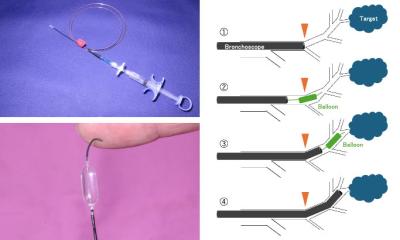Osteoarthritis
Arthroscopic surgery
By Jane MacDougall
Osteoarthritis of the knee is a degenerative disease that causes joint pain, stiffness and decreased function. Its frequency increases dramatically with ageing populations. Treatment is multidisciplinary; combinations of pharmacology, physiotherapy and/or surgery are used for most patients.
Before the disease reaches the stage where a total replacement is the only course of action, keyhole surgery is often performed. Using arthroscopy, lavage of the joint removes fragments of cartilage and calcium deposits. Also surgical smoothing (debridement) of the articular surfaces and osteophytes is undertaken, aiming to reduce synovitis and eliminate any mechanical obstruction to joint mobility.
Although widely practiced there is in fact little or no scientific evidence for any benefit from this procedure in osteoarthritis of the knee. In fact the results from a large-scale, randomised, controlled trial published in 2002 showed no benefit of surgery (Moseley JB, O’Malley K, Petersen NJ, et al. A controlled trial of arthroscopic surgery for osteoarthritis of the knee. N Engl J Med 2002;347:81-8). The trial methodology was heavily criticised and arthroscopy continued to be routinely used.
This September new results from Ontario (Canada) were published (Kirkley A, Birmingham T B, Litchfield RB, et al. A randomized trial of arthroscopic surgery for osteoarthritis of the knee. N Engl J Med 2008;359:1097-1107). This single-centre, randomised, controlled trial of arthroscopic surgery was carried out in 188 patients with moderate-to-severe osteoarthritis of the knee. Patients were randomly assigned to surgical lavage and arthroscopic debridement, together with optimised physiotherapy and medication (which included analgesics and non-steroidal anti-inflammatory agents) or to physiotherapy and medication alone. Arthroscopic surgery was performed under general anaesthesia within six weeks of randomisation of the patient.
At two years follow-up, the primary outcome was the total Western Ontario and McMaster Universities Osteoarthritis Index (WOMAC) score (range, 0 to 2400; higher scores indicate more severe symptoms). While secondary outcomes included the Short Form-36 (SF-36) Physical Component Summary score (range, 0 to 100; higher scores indicate better quality of life).
The patients were assessed by a nurse, blinded to treatment, 3, 6, 12, 18, and 24 months from the start of treatment. Interestingly, it was only at the first three-month visit that the results from surgery were significantly better than those in the medical group p>0.01. At the end of the study no difference was found between the two treatment groups: WOMAC scores were 874±624 in the arthroscopy group compared with 897±583 in the medical group (NS p=0.93). Different sub-group analyses also failed to find an advantage for surgical over medical treatment. Likewise surgery failed to show any improvement over medical treatment for quality of life and pain assessments (secondary endpoints).
However, as in all trials this one has limitations, perhaps excluding those patients who have large meniscal (‘bucket handle’) tears, in whom arthroscopic surgery is considered an effective option, biased the results towards medical intervention.
Perhaps the answer is for rheumatologists to judge each case on its individual merits and surgery be proposed after careful consideration of the particular individual rather than as a routine practice for all.
20.12.2008





